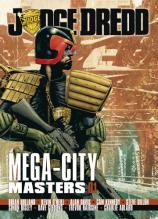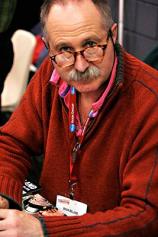Judge Dredd: Mega-City Masters, Vol 1
Review
Judge Dredd: Mega-City Masters, Vol 1
Even with the armed, foreboding image of Judge Dredd on the front of this collection (brilliantly produced by Tim Bradstreet), some American readers will need a serious dose of brain bleach or self-inflicted head trauma to erase any semblance of memory associating Sylvester Stallone with the authentic and original Dredd presented on these pages. Equating Dredd with any aspect of the 1995 movie will be quickly and thankfully be eradicated after a short vacation in the Mega-City One introduced within this book. As with other Rebellion/2000AD stateside launches within the past year, such as the brilliantly executed Lenny Zero and the Perps of Mega-City One by Andy Diggle, Jock, et.al, the Mega-City Masters volumes are directed primarily American readers unfamiliar with the weekly Progs of 2000AD or its sister publication, Judge Dredd Megazine. Furthermore, as a pre-emptive marketing campaign, Rebellion/2000AD deserves praise as these volumes will ideally situate the character within the collective, American mindset on the eve of the publisher's move to distribute its serialized comics weekly in the US beginning this August 2011 and the now, in post-production Dredd film starring Karl Urban as the dystopian hero rumored for a late 2011 release.
Following a short but succinct and well-informed history of Judge Dredd and his various creators over the years by editor and Tharg's representative on Earth, Matt Smith, Judge Dredd: Mega-City Masters 01 is not a chronological catalog of every single Dredd strip in order. Readers desiring the entire publication history should consult the now nearly twenty volume Judge Dredd: The Complete Case Files. Instead and smartly, Rebellion/2000AD have organized the volumes thematically, with the first installment focusing on the visualizations of Dredd over the decades by artists well-known and critically acclaimed here in America. While the majority of the strips are penned by John Wagner and Alan Grant, along with single entries by Gordon Rennie and Al Ewing, the varied artists, even beyond those listed on the cover, are some of the best, British sequential illustrators. Names already on the cover such as Bolland, Gibbons, and Adlard to name but a few hardly need any introduction for their various work with US comic publishers. Yet, readers will be pleasantly surprised by the inclusion of, in no particular order, pJohn Byrne, Brendan McCarthy, John Higgins, Chris Weston, Mark Farmer, Staz Johnson, Collin Wilson, Kevin Walker, Duncan Fegredo, Glen Fabry, Carlos Ezquerra, and Jock.
As with most anthologies, some stories are more memorable than others. And, while some audiences may not immediately appreciate or understand the satirical irreverence of the Mega-City judges in their dispensing of justice, Dredd's by-the-book, extremely black and white interpretation of law and order is sure to shock and thrill readers simultaneously. Even though the majority of the scripts are tight and well-developed, their brevity, as opposed to their longer, serialized fiction counterparts in the US, may be a slight hurdle for some uninitiated readers. Yet, the stars of this volume are the artists more than the individual tales, and this is where the book truly succeeds.
Even in black and white, there is no mistaking Dave Gibbons' beautiful work. His heavy, thick ink lines shape and reinforce the stark, post-apocalyptic nature of Mega-City alongside contributions from Alan Davis. Contrasted with the sharp, crisp line work of Steve Dillon, Kevin O'Neill, or Cam Kennedy, the black and white adds tones of gray and an even greater depth of power and vitality to the momentum and havoc of the authoritarian state. On the other end of the spectrum, full-colored strips from Brian Bolland and Dredd's co-creator Carlos Ezquerra join with a somewhat digital but fully psychedelic palette by John Higgins on "Joe Dredd's Blues," two iconic designs by Simon Bisley, and stellar entries by Chris Weston, Jock, Duncan Fegredo, and Charlie Adlard that could not be more different from each other. Fans who adore Bisley's fully painted cover work on Doom Patrol or Lobo will revel in his vision of Dredd. Weston brings the intensity and draftsmanship readers have come to know through his time on The Invisibles, The Filth, and The Fantastic Four. The Kirby-fusion of Jock with his more angular lines and thick ink pops against the darker, more sinister style of Fegredo. One aspect that may escape some readers is comparing the amazing color work by Chris Blythe on all three of these strips as he variates his hues and tones, playing to the pencillers' strengths and interpretations. Lastly, the master of horror, Adlard, cooks his Dredd in cooler tones, obscuring and over-saturating the images to give them a far more sinister, vicious emotion.
There is no better time to jump aboard the Dredd caravan as the summer winds down and more of this long, sought after material finally becomes available here in the US. Especially beneficial for readers wary of superhero continuity and parallel worlds, continuous big events, deaths and rebirths, and massive, unwieldy cross-overs, JUDGE DREDD: MEGA-CITY MASTERS 01 is a vital infusion to the static, superhero genre of the mainstream comic industry.
Reviewed by Nathan Wilson on July 9, 2012
Judge Dredd: Mega-City Masters, Vol 1
- Publication Date: August 17, 2010
- Genres: Crime, Fiction, Graphic Novel, Mystery
- Paperback: 272 pages
- Publisher: 2000 AD
- ISBN-10: 1906735921
- ISBN-13: 9781906735920





